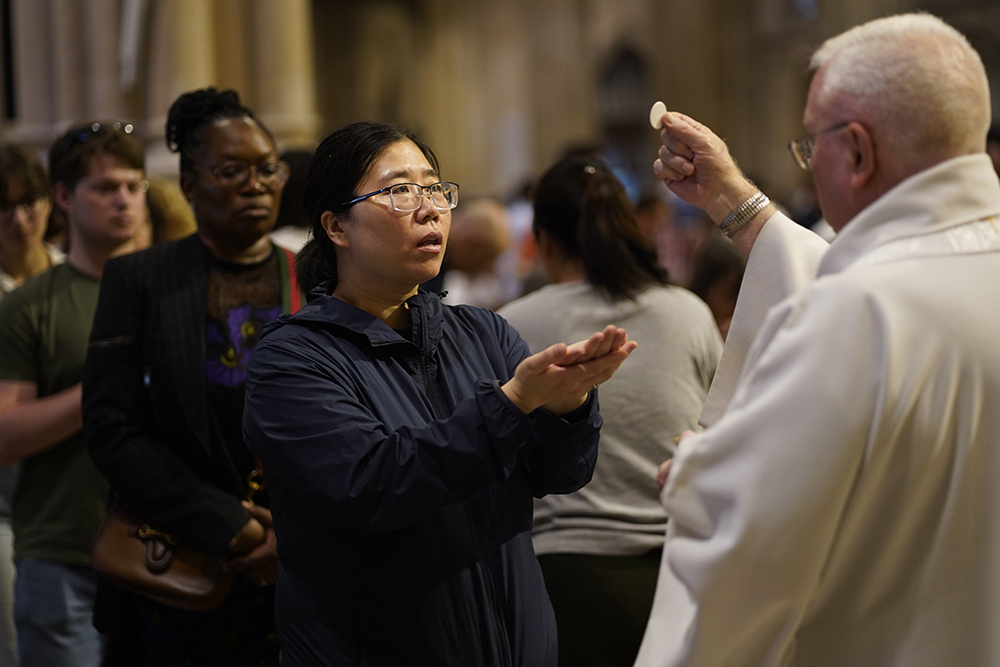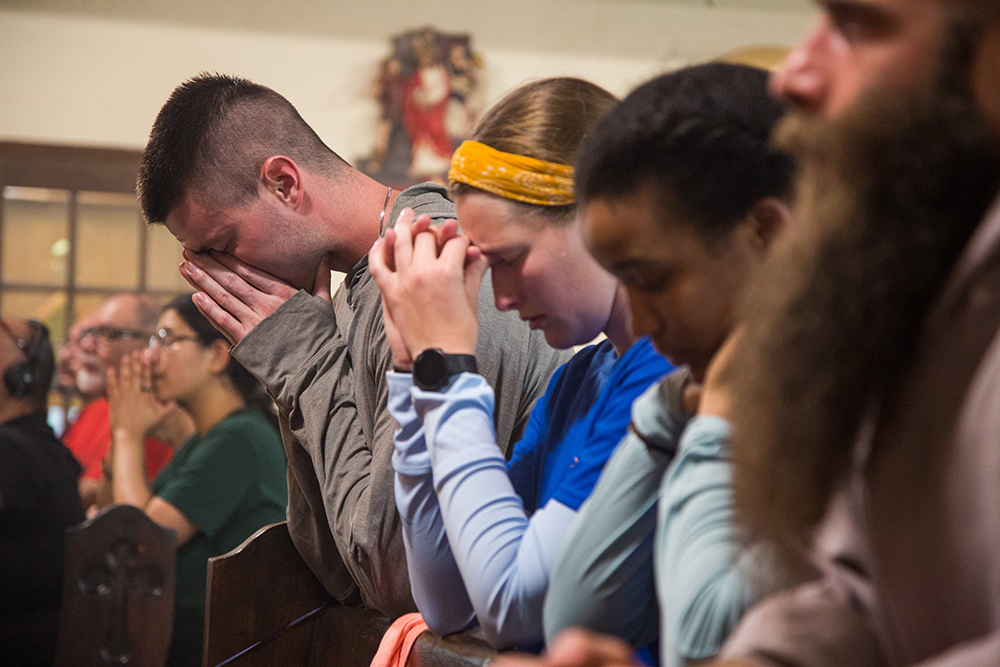
A woman receives Communion during Mass at St. Patrick's Cathedral in New York City May 26, 2024, the solemnity of the Most Holy Trinity. (OSV News/Gregory A. Shemitz)
A report from the U.S. Conference of Catholic Bishops on diocesan discussions about the Synod on Synodality released May 28 made clear how many issues are causing tensions in the American Catholic Church.
Disagreements exist over liturgy, the role of women, clericalism, sex abuse, church teaching and cultural and racial differences. But despite these tensions, the report sees reasons for hope.
The report — officially the "National Synthesis of the People of God in the United States of America for the Interim Stage of the 2021-2024 Synod" — summarizes the discussions that took place during Lent in dioceses in response to the October 2023 session of the synod. That session had been preceded by a worldwide consultative process, and the report is meant to help Catholics reflect on the results of the first session and provide new input for the next session, in October 2024.
For this latest round, more than 75% of U.S. dioceses submitted reports on more than 1,000 listening sessions involving more than 35,000 participants. These diocesan reports were summarized by regions of the country as input for the national synthesis.
In addition, more than 15 listening sessions were organized through working groups based on three priority areas: participation in church life, social justice and vocations. More than 350 people participated in these sessions devoted to Catholic education, women, lay movements, clergy, consecrated life, theologians, health care, migration and poverty.
Advertisement
The report acknowledges that the synodal process "unearthed tensions within our communion," although no one should be surprised by these tensions.
Some reflected the political and cultural divisions in American society. Other tensions were over "adaptability and innovation in how the Church evangelizes, welcomes, and reaches out to people," says the synthesis. These tensions appear both within the laity and the clergy because of different theologies and political preferences.
Pulling quotes from regional reports, the synthesis states, some "were challenged by the Church's 'indecisiveness,' by 'lack of reverence,' and by the perception that the Church is 'changing the traditional methods' and accepting current 'things against our church rules.' "
But others complained that "some are afraid of change and tired of doing new things, they are content with doing things the way it has always been done before." In their view, the church has "become complacent, even ossified."
Arguments over liturgical preferences and the Latin Mass, for example, point to "broader debates about tradition, modernity, and the best ways to nurture faith across the diverse spectrum of Catholic belief and practice."
There was tension between a welcoming spirit and the need to articulate church teaching.
"Some are very worried about how the Church responds to LGBTQ and other marginalized people … others want to stand firm in the Church's teaching and not shy away from the truth." It was expressed by many participants that "leadership in the Church needs to be clear about our truth; confusion is leading to frustration and division among the faithful."
"Numerous reports from the listening sessions," according to the synthesis, "cited instances of communication, both from the hierarchy and from secular and Catholic media, which reflect and perpetuate division within the universal church and send conflicting messages of what it means to be Catholic."

Perpetual Pilgrim Charlie McCullough prays during Mass at San Pedro Church in Brownsville, Texas, at the end of the first day of pilgrims' journey along the St. Juan Diego Route of the National Eucharistic Pilgrimage May 19, 2024. (OSV News/Tom McCarthy)
The participants wanted more clarity in messaging, but the report did not indicate what they thought the message should be.
Tensions also arise over Catholic social teaching, the enduring wounds of the sex abuse crisis, the legacy of racism and the ethnic and cultural diversity in parishes.
"Conversations on social justice and inclusion were filled with moments of profound pain and generational hurt," says the report. There was a widely expressed desire for a "greater emphasis on formation in Catholic Social Teaching that affirms the dignity of all lives as being made in God's image and likeness."
Other tensions come from the desire for greater participation of women in leadership roles in the church, the report acknowledges, but there is no mention of women deacons or women priests.
Despite all these tensions, the report hopes the synodal process will be a means of dealing with them. It says that this stage of the synodal process "has been marked by curiosity, creativity, signs of maturation, and an uncovering of tensions that reveal a desire to enter more deeply into the sources of our hope and trust."
"The Church, at its best," says the report, "can be seen as a Safe Harbor, where the faithful are embraced, sustained, and loved." It believes that "Parishes with numerous small faith communities, bible studies, and prayer groups prove most successful in welcoming and integrating people from diverse backgrounds." We need to be a community of compassion and openness, it says, "where we are in communion with our Lord and our neighbors."
At the same time, the church must be a "Fiery Communion that witnesses to the Gospel with prophetic zeal."
"Fiery Communion" can sound discordant, but "the Safe Harbor provided by and in the Church allows us prophetically to embrace the tensions of the Fiery Communion."
The report acknowledges that the synodal process "unearthed tensions within our communion," although no one should be surprised by these tensions.
The synthesis can be faulted for not mentioning the large numbers of young people leaving the church or the decline in the number of priests. While recommending better formation, catechesis and communications, its recommendations are so vague as to be unhelpful. These are complaints I have heard for 50 years as a priest.
The national synthesis gives a general picture of the state of the American church at this stage of the synodal process, which it sees as very successful. There are no surprises in the document, unless you count its openness in acknowledging tensions in the church. It is short, readable and worth reading. Any parish that plans to have a listening session would find it an excellent resource.
I think Pope Francis will like this report because, in the words of Bishop Daniel Flores of the Diocese of Brownsville, in Texas, it "reflects the sense that there exists among Catholics in the United States a deep desire to rebuild and strengthen our communion as the Body of Christ."
Flores, like Francis, believes, " Rebuilding trust where it is frayed involves practicing the humanly graceful art of listening to each other and speaking together. The more we do this, the more we realize that it is the Lord who never fails us."




